 In response to our first in a series of three Autostraddle Roundtables about feminism, several of you requested a “reading list” to introduce you to some of the basic literature grounding the feminist movement. Simple enough, right? Well, we knocked our heads together and came up with about 5 billion books, which is probs the difference between bloggers and people with PhDs?: they know how to write concise, clear, focused syllabi?
In response to our first in a series of three Autostraddle Roundtables about feminism, several of you requested a “reading list” to introduce you to some of the basic literature grounding the feminist movement. Simple enough, right? Well, we knocked our heads together and came up with about 5 billion books, which is probs the difference between bloggers and people with PhDs?: they know how to write concise, clear, focused syllabi?
So here’s your list ladies. Get in your hammock, lie on your porch, hide in your emo cave and READ SOME MOTHERFUCKING BOOKS, IDIOTS!
This list focuses primarily on the American feminist movement. Feel free to suggest some books outside of that scope in the comments! Unless otherwise noted, the descriptions in italics are from the back of the book.
We’ve also included some “Team Picks” from our friends and from us!
Everything is listed in order of publication date. The following color codes will also help you on your journey:
Purple: Women of Color
Pink: LGBT
Blue: Sex
Green: Body Image & Women’s Health
Orange: Pop Culture
+
Big Books Covering Expansive Periods of Time:
+
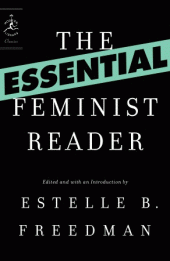 The Essential Feminist Reader (Modern Library Classics)
The Essential Feminist Reader (Modern Library Classics)
Edited by Estelle B. Freedman:
“…selections span more than five centuries. Moving beyond standard texts by English and American thinkers, this collection features primary source material from around the globe, including short works of fiction and drama, political manifestos, and the work of less well-known writers.”
Sisterhood Is Global: The International Women’s Movement Anthology
Edited by Robin Morgan:
“The anthology features original essays Morgan commissioned from a deliberately eclectic mix of women both famous and less known-grass-roots activisits, politicians, scholars, querillas, novelists, social scientists, and journalists-representing 70 countries, from every region and political system, with particular emphasis on the Global South.”
Sisterhood Is Forever: The Women’s Anthology for a New Millennium, Edited by Robin Morgan:
“Over 60 original essays Morgan commissioned from well-known feminist leaders plus energetic Gen X and Y activists — is a composite mural of the female experience in America: where we’ve been, where we are, where we’re going. The stunning scope of topics ranges from reproductive, health, and environmental issues to workplace inequities and the economics of women’s unpaid labor; from globalization to the politics of aging; from cyberspace, violence against women, and electoral politics to spirituality, the law, the media, and academia. The deliberately audacious mix of contributors spans different generations, races, ethnicities, and sexual preferences”
The World Split Open: How the Modern Women’s Movement Changed America.
by Ruth Rosen:
“For anyone who wants a thorough introduction to the modern American women’s movement, this is it: a rousing story of the revolution by a history professor who participated in its struggles.”
Transgender History
Edited by Susan Stryker:
“Covering American transgender history from the mid-twentieth century to today, Transgender History takes a chronological approach to the subject of transgender history, with each chapter covering major movements, writings, and events.”
Women of Color and Feminism
by Maythee Rojas:
“Maythee Rojas offers a look at the intricate crossroads of being a woman of color. Women of Color and Feminism tackles the question of how women of color experience feminism, and how race and socioeconomics can alter this experience.”
Daring To Be Bad: Radical Feminism in America 1967 – 1975
by Alice Echols:
“If we are still debating the relative importance of gender, class, and race, combating the power of capitalism and patriarchy, this valuable study shows that the discussion owes much to the radical feminists who hewed out the outlines of these issues.”
+
Dawn of Time to 1959
+
1792: A Vindication of the Rights of Woman, by Mary Wollstonecraft
1879: The Doll’s House, (play), by Henrik Ibsen
1892: The Yellow Wallpaper and Other Stories, by Charlotte Perkins Gilman
1892: WOC – A Voice From the South, by Anna Julia Cooper
1931: Living my Life, by Emma Goldman
1929: A Room of One’s Own, by Virginia Woolf
1949: The Second Sex, by Simone de Beauvoir
+
Sarah, Associate Editor:
The Awakening, by Kate Chopin
I first read The Awakening in high school. I didn’t realize why yet,
but I loved everything about it. Yes, even the ending.
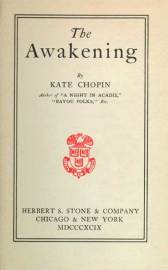
+
1960 to 1969
+
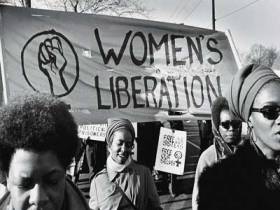 1963: The Feminine Mystique by Betty Friedan – “This is the book that defined “the problem that has no name,” that launched the Second Wave of the feminist movement, and has been awakening women and men with its insights into social relations, which still remain fresh, ever since. A national bestseller, with over 1 million copies sold.”
1963: The Feminine Mystique by Betty Friedan – “This is the book that defined “the problem that has no name,” that launched the Second Wave of the feminist movement, and has been awakening women and men with its insights into social relations, which still remain fresh, ever since. A national bestseller, with over 1 million copies sold.”
1967: In Search of Our Mothers’ Gardens: Womanist Prose, by Alice Walker
1967: Diary of a Mad Housewife (a novel), by Sue Kaufman.
1968: SCUM Manifesto, by Valerie Solanas – “…the Manifesto, for all its vitriol, is impossible to dismiss as just the rantings of a lesbian lunatic.”
1969: Black Women’s Manifesto; Double Jeopardy: To Be Black and Female, by Frances M. Beal
1969: Sexual Politics, by Kate Millett
+
+
Laneia, Executive Editor:
Rubyfruit Jungle by Rita Mae Brown:
[QUEER]
Obviously this novel isn’t specifically about feminism, but it was one of the first books I read that questioned gender roles in a way that really opened my eyes. I credit it with giving me the nerve to take control of my life.
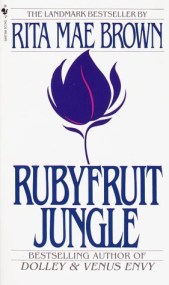
+
1970 to 1979
+
1970:The Female Eunuch, by Germaine Greer:
“The publication of Germaine Greer’s The Female Eunuch in 1970 was a landmark event, raising eyebrows and ire while creating a shock wave of recognition in women around the world with its steadfast assertion that sexual liberation is the key to women’s liberation.”
1971: The Dialectic of Sex: The Case for Feminist Revolution, by Shulamith Firestone.
1971: Our Bodies, Ourselves: A New Edition for a New Era (Boston Women’s Health Book Collective) by Judy Norsigian.
1972: Memoirs of an Ex-Prom Queen, by Alix Kates Shulmans – considered “the first feminist novel.”
1973: Toward a New Psychology of Women, by Jean Baker Miller
1973: Fear of Flying (novel), by Erica Jong
1974: Lesbian Nation: The Feminist Solution by Jill Johnston
1974: Against Our Will: Men, Women, and Rape, by Susan Brownmiller
+
1980 to 1989
+
1980: On Lies, Secrets, and Silence: Selected Prose 1966 – 1978 by Adrienne Rich
1981: Ain’t I a Woman? Black Woman and Feminism by bell hooks:
“In this classic study, cultural critic bell hooks examines how black women, from the seventeenth century to the present day, were and are oppressed by both white men and black men and by white women. Illustrating her analysis with moving personal accounts, “Ain’t I a Woman” is deeply critical of the racism inherent in the thought of many middle-class white feminists who have failed to address issues of race and class.”
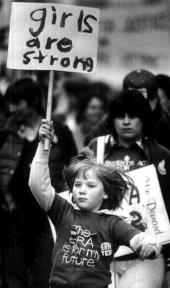
1981: This Bridge Called My Back: Writings by Radical Women of Color, by Cherie Moraga
1983: Women, Race, & Class, by Angela Davis
1984: Sister Outsider: Essays and Speeches (Crossing Press Feminist Series), by Audre Lorde
1984: Feminist Theory From Margin to Center, by bell hooks
1985: The Handmaid’s Tale, (novel) by Margaret Atwood:
“I was reading this novel when 9/11 happened and it scared the shit out of me.” (-Riese)
1987: Borderlands/La Frontera: The New Mestiza, Third Edition, by Gloria Anzaldua:
“Anzaldua, a Chicana native of Texas, explores in prose and poetry the murky, precarious existence of those living on the frontier between cultures and languages. Writing in a lyrical mixture of Spanish and English that is her unique heritage, she meditates on the condition of Chicanos in Anglo culture, women in Hispanic culture, and lesbians in the straight world.”
1989: The Woman Warrior: Memoirs of a Girlhood Among Ghosts, by Maxine Hong Kingston.
+
Riese, Editor-in-Chief:
Appetites: Why Women Want, by Caroline Knapp (2003)
[BODY IMAGE + HEALTH]
Even if you’ve never suffered from an eating disorder, Knapp’s insights on how society has encouraged women to submerge desire and exalted expressions of restraint is worth your attention. A quote:
“the female journey in [the clash between the desire to satisfy appetities and the fear that they may overwhelm us, control us] can be exeprienced and expressed in particularly painful and confounding ways, women beng the gender born and raised on the notion that the female appetite is limited and curtailed to begin with, that female hungers should be reined in, permitted satisfaction in only the most circumscribed, socially sanctioned ways.”
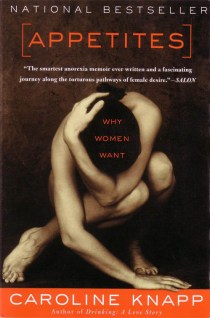
+
1990 to 1999
+
1991: Backlash: The Undeclared War Against American Women, by Susan Faludi:
“Far from being “liberated,” American women in the 1980s were victims of a powerful backlash against the handful of small, hard-won victories the feminist movement had achieved… the alleged “man shortage” endangering women’s chances of marrying and the “infertility epidemic” said to strike professional women who postpone childbearing are largely media inventions. She finds evidence of antifeminist backlash in Hollywood movies, in TV’s thirtysomething , in 1980s fashion ads featuring battered models and in the New Right’s attack on women’s rights. This eloquent, brilliantly argued book should be read by everyone concerned about gender equality.”
1991: The Beauty Myth: How Images of Beauty Are Used Against Women, by Naomi Wolf:
“Feminist Naomi Wolf argues that women’s insecurities are heightened by these images, then exploited by the diet, cosmetic, and plastic surgery industries. Every day new products are introduced to “correct” inherently female “flaws,” drawing women into an obsessive and hopeless cycle built around the attempt to reach an impossible standard of beauty. Wolf rejects the standard and embraces the naturally distinct beauty of all women.”
1992: The Persistent Desire: A Femme-Butch Reader by Joan Nestle
1993: Stone Butch Blues (novel), by Leslie Feinberg
1995: Where the Girls Are: Growing Up Female with the Mass Media, by Susan J. Douglas
1995: Schoolgirls: Young Women, Self Esteem and the Confidence Gap by Peggy Orenstein
“Following a 1990 poll which found that girls suffer plummeting self-esteem and reduced expectations as they enter adolescence, journalist Orenstein visited two California middle schools to take a more personal look at the statistics.”
“+
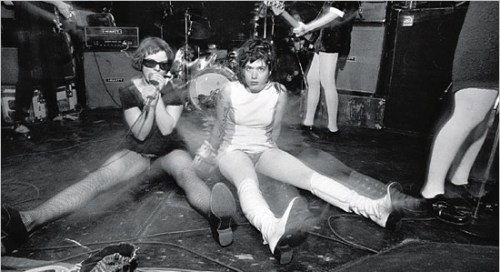
1995: Gender Outlaw: On Men, Women and the Rest of Us by Kate Bornstein
1997: SEX – Whores and Other Feminists, edited by Jill Nagle
1997: Pomosexuals: Challenging Assumptions About Gender & Sexuality, edited by Carol Queen, Lawrence Schimel and Kate Bornstien
1997: Sex Changes: The Politics of Transgenderism, by Patrick Califia-Rice
1998: The Body Project, by Joan Jacobs Brumberg
1998: The Vagina Monologues, by Eve Ensler
1998: The Guerrilla Girls’ Bedside Companion to the History of Western Art, by The Guerrilla Girls
1999: Can’t Buy My Love: How Advertising Changes the Way We Think and Feel, by Jean Kilbourne
1999: The Bust Guide to the New Girl Order, edited by Debbie Stoler and Marcelle Karp
+
Natalie, Contributing Writer
Gender Trouble: Feminism and the Subversion of Identity by Judith Butler
[QUEER/TRANS]
Really heavy on the theory…but gets to the heart of feminism – which is, I think, to analyze and break down false/artificial binaries, dichotomies, hierarchies etc. and challenge, challenge, challenge “norms.”
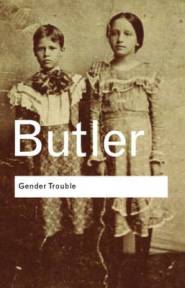
+
2000 to present
+
2000: Feminism Is for Everybody: Passionate Politics, by bell hooks
2000: Women and Power in Native North America, by Laura F. Klein (Author) and Lillian A. Ackerman (Editor).
2000: Tales Of The Lavender Menace: A Memoir Of Liberation, by Karla Jay.
2000: Slut! Growing Up Female with a Bad Reputation, by Leora Tanenbaum
2000: Manifesta [10th Anniversary Edition]: Young Women, Feminism, and the Future, by Jennifer Baumgardner & Amy Richards:
“Manifesta, which is far less shrill than the name suggests, urges young women to pick up where their mothers, aunts, and adult mentors left off. Their challenge? To fulfill feminism’s promise of justice, equality, and sexual freedom for all. Complete with appendixes to teach novices the nuts-and-bolts of community organizing, this book is a reasoned and passionate call to action and an exciting how-to guide for both burgeoning and seasoned Third Wave feminists.”
2001: YELL-Oh Girls!, by Vickie Nam.
2001: Turbo Chicks: Talking Young Feminisms, by Lisa Bryn Rundle, edited by Lara Karaian and Allison Mitchell.
2002: Jane Sexes It Up: True Confessions of Feminist Desire, by Merri Lisa Johnson
2002: Colonize This!: Young Women of Color on Today’s Feminism (Live Girls)
2002: Cunt: A Declaration of Independence Expanded and Updated Second Edition, by Inga Muscio
“This is particularly relevant for women with feelings about the tampon-industrial complex.” – Riese
2002: Nickel and Dimed: On (Not) Getting By in America, by Barbara Ehrenreich
2003: Reading Lolita in Tehran: A Memoir in Books, by Azar Nafisi
2005: Women and Madness: Revised and Updated, by Phyllis Chesler
2006: BITCHfest: Ten Years of Cultural Criticism from the Pages of Bitch Magazine.
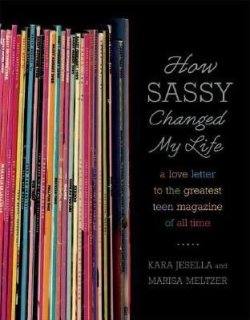 2006: Female Chauvinist Pigs: Women and the Rise of Raunch Culture, by Ariel Levy
2006: Female Chauvinist Pigs: Women and the Rise of Raunch Culture, by Ariel Levy
2006: Virginity or Death!: And Other Social and Political Issues of Our Time, by Katha Pollitt
2007: Whipping Girl: A Transsexual Woman on Sexism and the Scapegoating of Femininity, by Julia Serano:
“With her first full-length book, biologist, writer and musician Serano positions herself as a Betty Friedan of the transsexual community. Making a case that trans discrimination is steeped in sexism and that trans activism is a feminist movement, Serano delivers a series of articulate, compelling and provocative essays that unmask many of the misconceptions surrounding transsexualism, gender and feminism.”
2006: We Don’t Need Another Wave: Dispatches from the Next Generation of Feminists, by Melody Berger
2007: Full Frontal Feminism: A Young Woman’s Guide to Why Feminism Matters, by Jessica Valenti
2007: How Sassy Changed My Life: A Love Letter to the Greatest Teen Magazine of All Time, by Kara Jesella and Marisa Meltzer.
“autostraddle is based on this book more or less” -Riese
2008: Feminism and Pop Culture, by Andi Zeisler
2008: Yes Means Yes: Visions of Female Sexual Power and a World Without Rape by Jaclyn Friedman and Jessica Valenti
2009: The Purity Myth: How America’s Obsession with Virginity Is Hurting Young Women, by Jessica Valenti
2009: When Everything Changed: The Amazing Journey of American Women from 1960 to Present by Gail Collins
2010: Girl Power: The Nineties Revolution in Music, by Marisa Meltzer
2010: The Kaleidoscope of Gender: Prisms, Patterns, and Possibilities (Third Edition), edited by Joan Z. Spade and Catherine G. Valentine
+
Marisa Meltzer, Feminist Author:
Enlightened Sexism: The Seductive Message that Feminism’s Work Is Done, by Susan J. Douglas
“This book exams pop culture from the early ’90s until the present and posits that there’s more lip service paid to feminism than ever, but without the politics to back up real societal change.”
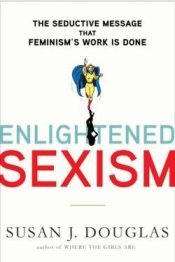





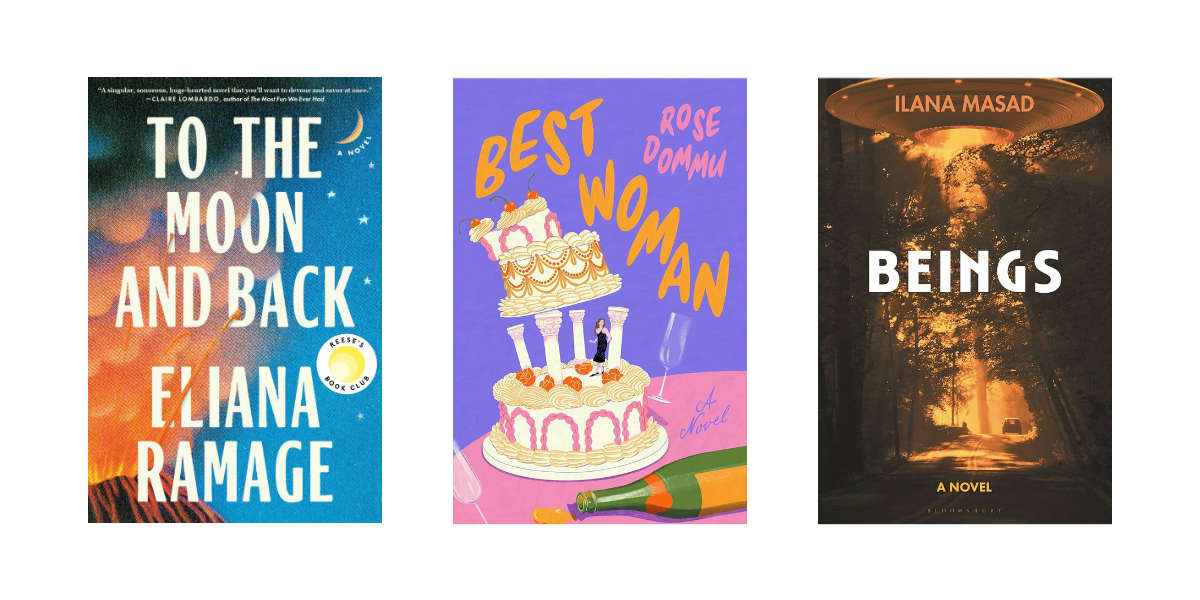


Comments
hey, this is a great list! but, it makes me sad that the links all take us to amazon, which is a pretty fucked up company (remember when they classified ALL queer books as “porn” and took them off their website?). why not try looking for these books at http://www.betterworldbooks.com, which is the same concept as amazon but less crappy, or your local independent bookstore (if you still have one, sigh) or your library?
WORD. I’ve been boycotting Amazon ever since.
hi!
it’s been said before, but it’s worth saying again: we have an associate’s account with amazon.com. when you buy things from them through our links, we get a very tiny portion of the money you spend. that means we can pay our bills and eat semi-nutritious food while we slave away at our computers for you! :)
some of the books on this list link to abebooks.com, which is comprised entirely of independent booksellers
we encourage you to purchase books from whomever you see fit, including local brick-and-mortar sellers in you area! perhaps you could even find it in your heart to support other independent, small businesses – like Autostraddle!
xoxo
Yes, I’d like to echo that sentiment! ROBIN HOODING IT, PEOPLE. Autostraddle isn’t owned by a giant corporation like most other lesbian websites of this size. We are an independent women-owned business and our commitment to uncensored, free content requires sacrificing a lot of things, like food and happiness!
It also means little compromises. We’ve found over time that the amazon associate program offers us returns far above & beyond what we’ve experienced with any other program. We’ve tried associate programs with other booksellers and unfortunately, never made a single sale! Seriously. Zero. Yes; confusing to us too. Partially this is ’cause of Amazon’s overall inventory — click out via as to amazon and we get a percentage of whatever you buy even if it’s not the product from our page — a baby stroller, a t-shirt, a book we recommended, anything!
Remember that all the books you buy, from wherever you buy them, support the writers that wrote them and the publishers that publish them in addition to the store you buy it from. AND Amazon offers you the choice to buy your books from used booksellers and independent booksellers via their website as well, so you can always bypass the “order from amazon” option for the “buy from these sellers” option.
Of course as Laneia said, you’re welcome to purchase your books wherever you want, and we do encourage you above all else to visit your brick-and-mortal indie sellers (many of whom also sell inventory that keeps them in business via amazon’s third-party program, as aforementioned.) Most of you do buy used books via amazon, and money is tight, so that tends to be a more popular website for our demographic.
For what it’s worth, Amazon apologized directly to GLAAD for the aforementioned gay/adult debacle, fixed the problem, and an employee explained it here. My opposition to amazon is more about the overall big-box retailer control over how we can access and experience art, and as soon as we can afford to, we’ll re-evaluate our choice to use our associate account thusly.
I guess I’m not defending supporting ‘the man’… I’m defending us — we’re paying attention, we’ve looked into the options and feel okay about it.
IF BUYING “CUNT A DECLARATION OF INDEPENDENCE” IS WRONG THEN I DON’T WANNA BE RIGHT
hey, i didn’t know that you ladiez got paid for every click to amazon. i understand that you gotta do what you gotta do to pay the bills; it makes a lot more sense now. i just assumed that amazon was the default choice for linkage because it’s the biggest bookselling website out there. i’m sorry if i offended anyone!
you didn’t offend us at all! not everyone knows about the associates program and i was just using your comment as a good opportunity to sort of explain what we’re up to!
xo!
yes, what laneia said!
XOXOXOXOXO
(if i sound defensive, it’s cause i’m self-conscious about it obvs, and that probs comes through)
Hi, does your Amazon associate program work from Europe as well? I buy tons of books from Amazon, but from the UK website (amazon.co.uk) because I save on shipping expenses and it takes less time.
So if it works on amazon.co.uk that would be great news.
oh jeez, I have only read a fraction of the mentioned books and all of them novels. I guess I need to stray from the Sci Fi section for a while and pick up one of these books because seeing this list I feel woefully uninformed and the opposite of well read when it comes to feminism.
There is a shitton of feminist sci fi :)
What about: “Yes Means Yes: Visions of Female Sexual Power and
a World Without Rape” edited by Jaclyn Friedman and Jessica Valenti ??
I second that! “Yes Means Yes” totally changed my life.
i’ve added “Yes Means Yes” to the list. thanks!
YES!!!
Greetings from an old lesbian.
This is an excellent list and I’ve read most of these books. I have had conversations with some of the authors.
These are the books that spoke my heart and brought me to my knees. I would also suggest that you add “The Women Who Hate Me” by Dorothy Allison. Also explore how many of our best writers, like Andrea Dworkin were co-opted by the right in the fight against violence against women.
Don’t discount the work of Gloria Steinhem either. Even though NOW seemed irrelevant for working class women, it did help us carve out our revolution. One additional book – “The Persistent Desire: A Butch-Femme Reader” by Joan Nestle one of the true pioneers of the working class feminist reality.
By studying these books and writers you can continue with the second wave and invent new wheels, not have to re-invent the old ones.
Enjoy womyn!
thank you for these suggestions! i haven’t read The Women Who Hate Me and i plan to change that immediately.
we’ve added The Persistent Desire to the list!
This is just fantastic! thank you, thank you!
A+ choices, girls.
The Awakening is easily one of my favorite books of all time. If you consider the context, it was actually a pretty bold book to be writing…Kate Chopin, you are righteous. End of discussion.
And holy shit, I can’t even count how many times I used “Slut!…” by Tanenbaum and “Gender Outlaw…” by Bornstein in my Sociology papers.
Way to stir my interest. NOW I’M GOING TO HAVE TO SIT DOWN AND READ BOOKS WITHOUT PICTURES.
List is great, but my nerd parts have to be more specific and add that I love Autostraddle a trillion times more since I found out it’s based on a book.
I have not read any of these books. I never considered myself to be a feminist. I was just talking to someone about how I would never burn my bra. I love my bra. It does wonderful things for me. The only form of oppression I have encountered is stockings, the work of a he-devil.
But anyway I will read at least one of these books. I need to be inspired.
feminism: not about setting fire to any articles of clothing
Oh I know. I am not that ignorant. I was joking with someone and that is the first thing that popped into my mind. I have this theory that man,( the word, the gender,etc,) is derived from woman and not the other way around. And he called me a feminist. I have never thought of myself as a feminist.
well if you think that women should not be treated like shit then you’re a feminist. welcome!
interestingly enough, according to one of my profs the whole “bra-burning” thing (and this isn’t directed at you MsNJS, just a fun fact) never actually happened. APPARENTLY, at the big Miss America protest thing-o that happened sometime in the 70s, a bunch of feminists WERE going to light a fire in a barrel and throw their bras in, but they COULDN’T GET A FIRE PERMIT. so no bra was ever burned. tell your friends. the end.
Ahh, thank you. You learn something new everyday. Its so funny how fiction gets warped into fact..
@MsNJS- I agree, the fact-fiction thing is really interesting, in an amusing/disturbing kind of way.
@anyone that may be interested- Some of Lindsy Van Gelder’s (the reporter that wrote “Bra Burners & Miss America”) thoughts on it:
“So I came back to the Post with what I thought was a serious political story about a serious new movement, but the city desk still wanted ‘funny.’ So I complied. This was how the term ‘bra burner’ got coined.”
“In fact […] they never burned their bras because of the fire laws in Atlantic City. But the term became history. I shudder to think that will be my epitaph— She invented bra burning.”
… and so, the Freedom Bonfire idea became the Freedom Trash Can idea.
@bcw- I’m sorry, I know you said the end but I find this fun fact particularly fun and also think that we should all tell our friends; ‘bra thrower’ burns (¡JA!) a lot less.
@AS- Thank you very much for the list. The book I quoted was “In our time: Memoir of a Revolution” by Susan Brownmiller, which I actually never finished because it’s a very reference/name heavy book and I didn’t feel it was the best starting-off point for me. It has really interesting insights but I felt I needed to read directly from some of the women she mentions before reading about them (yes, this is me rationalizing my laziness). So this list comes really handy. Lists are lovely anyways, especially color-coded ones.
@wepa- Shut it!
Lindsy Van Gelder also co-wrote “The Girls Next Door” which is another fantastic book about lesbian life all over the US!
Yes. hellz yes. Made my day, AS. Sure now I have to get back in my car and go back to the library, but yeah, worth it.
also, how awesome is my library, that it has almost every book on this list?
this whole post is amazing. this post might even make my #1 fave slot, bumping the current fave “Boyshorts 101” to a tight second.
I just wrote a paper about lesbian literature for my GLBT literature class. And this list could have been so useful in my research. Damn! Oh well.
Also, The Feminine Mystique is none too kind to lesbians. Friedan compared homosexuality to a smog that was sweeping over America. Jill Johnston wrote a book called Lesbian Nation that is about the lesbian feminist movement. I think that’s the book that said that all women are lesbians except those that don’t know it. Yeah…I wish that were true. :)
i’ve added “Lesbian Nation” to the list. thanks!
it took me like four days to read this but I LOVE IT SO MUCH. jane sexes it up and appetites both gave me so many feelings, in fact they are still giving me feelings to this day. also i kind of hate myself for not having read the rubyfruit jungle yet. the end.
Awesome list! I love the variety of viewpoints and genres. I feel like I’ve been looking for/trying to create this list for a long time.
One correction: Warrior Woman should be listed under WOC – Kingston is Chinese American.
corrected. thanks!
I have read 3.5 of these books, and that’s 3.5 more than I expected! Great list.
\emph{When Everything Changed} by Gail Collins, 2009. My mom gave me this for my birthday and it rocked my world.
i’ve added When Everything Changed to the list. i saw this at my local bookstore last year and kept meaning to pick it up but never did. thanks for reminding me!
I know that with debating feminism here i am throwing myself into the lions den. As a lone lion battling a horde of christians armed to the teeth with all manners of lion slaying
armaments i may already be doomed.
There is no doubt that the values of our time are unhealthy and a recalibration is needed. Starting at a personal level with the great and in time the masses will follow. These diseased values go wider then the feminist and LGBT issues but they are at the center.
But i ponder over this idea that all people should be viewed as beautiful. Than the word would lose it´s meaning. Are we not then celebrating mediocracy, and damned to it.
Finally one thing we must not try to integrate feminism and the LGBT community into society but integrate society into our movement.
Thank you so much for this, I’ve been wanting to do more feminist reading but didn’t know where to start!
Another good Margaret Atwood novel that explores some interesting feminist ideas is ‘The Edible Woman’. It does have a fair bit of 1960s bleakness to it however.
Aw sweet, I’ve been meaning to get back into feminist readings before I go to college, thanks for the list!
I’m sad to say I have read 0.00000% of these books, which is a bummer. What’s worse is I have even had the opportunity to read them, as one of my ex-girlfriends was majoring in Women’s Studies and so had a lot of these on hand. She wanted me to read them but I didn’t for precisely that reason, out of spite you know and errr it was uhm a complicated relationship and sorry for the #overshare. *cough*
Excited to get to these! Nice post ladies!
school’s almost over and this looks like a great place to find books for summer reading.
I can’t even begin to say how great this post / list is
BUT
you forgot my favorite in the “dawn of time to 1959” category:
John Stuart Mill “The Subjection of Women” (1869)
http://en.wikipedia.org/wiki/The_Subjection_of_Women
Oh man, I have only actually read a handful of these! Once I finish Chely Wright’s book (I just picked it up) I think I will stay on my break from what I have been reading (YA books and graphic novels) and pick up a couple of these…
Alison Bechdel’s two graphic novels (one of which was turned into an award-winning broadway play, of all things) are about growing up lesbian in a small rural town. She also wrote a “comic strip” for over 10 years which was phenomenal, humorously documenting the lives of lesbian feminists as they lived in the Patriarchy. Still, do read some of these books. Phenomenal education, and much needed
[…] has a list of over 70 essential books for the beginner in feminism. The list is ordered by publication date and colour-coded by subject […]
I’ve read like 24 of these books and at least a chapter/excerpt (HOLLER WHO LOVES COURSEPACKS I DO) of about 15 of them? As a co-creator of this list I feel like that percentage actually isn’t very impressive
i am so excited to add these to my booklist this summer.
Wow! Fantastic list. Thanks for this!
One thing, however. bell hooks very consciously chose to write under the noncapitalized version of her name as a political statement.
And bell hooks rocks my socks…that is all.
I’m so happy that Reading Lolita in Tehran is on this list. That book is SO good. Everyone should read it!!!
This is a fantastic list! I’ve only read three of them, but I own a handful more.
I’M ABOUT TO MAKE SWEET LOVE TO YOUR AVATAR. STANDBY.
eta: why have i never heard the term ‘lesbrarian’ before now? genius.
Oh cool – you can get The Awakening as a free audiobook download from this link http://www.openculture.com/freeaudiobooks
:)
So stoked over this list. I’ve been looking for something like this to supplement my reading list for the summer, and this was PERFECT. Also here to echo the commenter above and the list on Reading Lolita in Tehran. So heartbreaking and inspiring.
Amazing list! Solves the problem of what to ask for for my birthday too :)
There’s three new books out this year that’re worth a mention too I think – ‘Living Dolls’ by Natasha Walter (I’m on the last chapter and it’s pretty interesting stuff, very modern), ‘The Equality Illusion’ by Kat Banyard (who has just founded Uk Feminista – http://www.ukfeminista.org.uk/) and ‘Reclaiming The F-Word’, which is out this month and is by Catherine Redfern (founder of ‘The F-Word’ blog!) and Kristin Aune…
Wow, this list is very impressive. I’m happy to report that I’ve already read several of these, but still have some reading to do.
Thanks, Autostraddle!
Susan Gabriel
author of Seeking Sara Summers
(a novel about falling in love with your best friend)
I bought Beauty Myth by Woolf from a library sale. I was looking for anything to read and it caught my eye. It was only a dollar so I didn’t feel like it would be a huge loss if it ended up being boring. Little did I know that the book would change my life. I see things everyday around me that make me think of this book.
Cunt: A Declaration of Independence changed my life at 17.
Just finished Sisterhood is Forever, which was great. However, only one article even referred to lesbians within the feminist context. It was still pretty diverse–women of colour, dis/ability, socioeconomic standing, age specific groups, etc.
If anyone is a super classical music geek like I am, there’s also Queering the Pitch: The New Gay and Lesbian Musicology. There’s a really sexy/academic/generally bitchin’ article by Elizabeth Wood called Sapphonics. It pretty much sexes the female operatic voice UP.
Oooh I got giddy with excitement when I found a gay and lesbian section in a bookshop on my holidays in Orlando and I bought Gender Outlaw because it looks really good and now I found out it’s on this list. YAY!
No Dworkin? No Daly? No Jeffreys? No MacKinnon?
Appetites is one of the most fantastic books of all times. Even after reading it more times than I would like to admit I still see new things.
That being said I would love to see Intercourse by Dworkin up there. She is a bit black and white for my taste but she asks the hard questions that have made me re-evaluate my actions as a woman.
Ladies Almanack by Djuna Barnes is excellent. Czk out the woodcut prints, subversive tone, and enjoy.
I am super, super disappointed and beyond sad that Color of Violence: The INCITE Anthology is not on this list: http://www.southendpress.org/2005/items/8762X
It is actually the best.
” What would it take to end violence against women of color?
How does the mainstream antiviolence movement help? How does it hinder?
When will we admit that repositioning women of color at the center of the movement—
women more often harmed by the police, prisons, and border patrols than aided by them—
means that we must address state violence?
In Color of Violence, INCITE! demands that we
• reconsider a reliance on the criminal justice system for solving women’s struggles with domestic violence;
• acknowledge how militarism subjects women to extreme levels of violence perpetrated from within, and without, their communities;
• recognize how the medical establishment inflicts violence—such as involuntary sterilization and inadequate health care—on women of color;
• devise new strategies for cross-cultural dialogue, theorizing, and alliance building;
• and much, much more.”
I’ve read Rubyfruit Jungle when I was younger and was still trying to identify my sexuality and it helped me realize that I didn’t have to define my sexuality. I am already defying the norms by loving women, why not defy it further by not labelling my preference..
Much love autostraddle! :)
Why is Sex for One by Betty Dodson not on here? That book changed my life :)
This is a great list! I work at a library and I’ve been relying on this list heavily for putting together our Women’s History Month display. I was also thinking of printing out this list and handing them out to students, but just copying and pasting is a little messy- is there any way to get a prettified PDF for that purpose?
My library has none of these. None. I’m going to scream.
Bad Girls by Catherine Lumby NEEDS to be added to this list.
<3
Hale yah
Wonderful to read the list. I have read some of the books. Are any of these available as audio book for free download. I manage to find very little time to read these days, but do a lot of travelling. Hope to put that time to better use by listening to audio-books. Also looking for free ones, as buying books has become a luxury for me these days.
This is a fantastic list, thank you for making this!
I would add “A Women’s Room by Marilyn French”. It was a little controversial but it is one of the first feminist novels.
Rad reading list. I took classes with Alice Echols and Jack Halberstam, which ended up being two of best classes I ever took. They’re truly brilliant queer feminist scholars!
#notbraggingatall
I haven’t read it yet (and this list was written awhile ago) but what about adding Melissa Harris-Perry’s most recent book to the WOC list?
This list makes me hate living in a country where the libraries only hold a few books in English. :(
THIS IS EVERYTHING GREAT ABOUT THIS SITE. Keep it up! Education is power, without my literary grandmothers, I would be perplexed and poor in spirit, not only in pocket change.
Is “Sexing the Body” by Anne-Fausto Sterling on here? It should be! Non-fiction, covers pathology, history, asserts the presence of more than two sexes. INCREDIBLE.
[…] Feminism 101: Read Books, Become a Better Womyn […]
[…] Feminism 101: Read Books, Become a Better Womyn […]
[…] more book suggestions that pertain to feminism and equality, check out these reading lists from Autostraddle, The Advocate, and The […]
[…] 5/7/2010: Autostraddle – Feminism 101: Read Books, Become a Better Womyn […]
[…] Audiostraddle: Feminism 101: Read Books, Become a Better Womyn […]
[…] or your ex girlfriend. This means, as part of your preparation for the date, you may want to read a book, the newspaper, or cultivate a […]